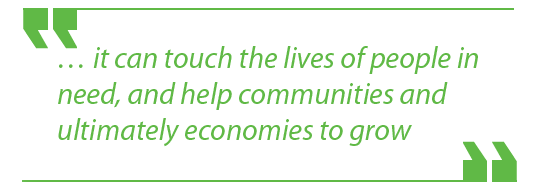Make a difference with a career in development finance
It is easy to associate development finance with finding ways to finance growth projects such as schools, houses and hospitals. However, browsing through the wide range of projects handled by the World Bank Group alone makes for fascinating reading and gives one insight into the enormous need for development finance around the world.
These development finance projects range from initiatives to improve secondary schooling in Ghana to ones that provide an internet infrastructure for Malawi, reduce elephant poaching and human-elephant conflicts in the south of Gabon, develop sustainable land and water management practices for the coffee landscape of Burundi, implement better forest management in Belarus, and develop carbon capturing and storage in South Africa.
Indeed, as the World Bank Group says, helping to create sustainable economic growth is “the surest path out of poverty”. Since 1947, the World Bank has funded over 12 000 development projects via traditional loans, interest-free credits and grants.
In South Africa, the Development Bank of Southern Africa plays a key role in delivering developmental infrastructure to this country and other African countries. One of its roles is to increase access to development finance and to implement sustainable development solutions to improve people’s quality of life and to support economic growth, regional integration and the sustainable use of scarce resources.
What does it take to work in the field of development finance?
In essence, people who want to follow a career in development finance need to know how to leverage resources to finance infrastructural projects such as roads and houses and to support the development of entrepreneurship by growing small businesses. They also need to support the formulation and implementation of policies to make this happen. These are scarce skills in Africa.
These specialists use well-designed development finance techniques to structure finance plans in order to implement development projects. Hence, they need to understand the complexities of and manage the different development finance resources available to poor countries, especially in Africa. They also need to know how to analyse risks, evaluate investment proposals, appraise the financial health and value of a firm, conduct due diligence investigations, and draw up reports.
Once they have acquired the necessary knowledge and skills, they will typically work for international finance institutions such as the World Bank, global development agencies such as the United Nations Development Programme (UNDP) or the myriad of development finance institutions (DFIs) that play a fundamental role in emerging markets. DFIs in South Africa include the Development Bank of Southern Africa (DBSA), the Land Bank and the Industrial Development Corporation (IDC). They can also work for governments and financial institutions such as banks as financial managers, analysts or project managers.
Finding ways to finance growth projects – especially in Africa – comes with a fair share of challenges. However, when successful, it can touch the lives of people in need, and help communities and ultimately economies to grow.
If you want to contribute to the sustainable development of your region, you will find a career in development finance a fulfilling one.
Consider the University of Stellenbosch Business School’s Postgraduate Diploma in Development Finance or PhD in Development Finance. With all 2021 programmes, it is offered via USB’s immersive and flexible Blended Learning format. If you are someone who is interested in pursuing this programme feel free to contact USB for more information.
Subscribe
Want to stay in touch with the Stellenbosch Business School community? Sign up and receive newsletters from our desk to your inbox.
SIGN UP


Leave Your Comment